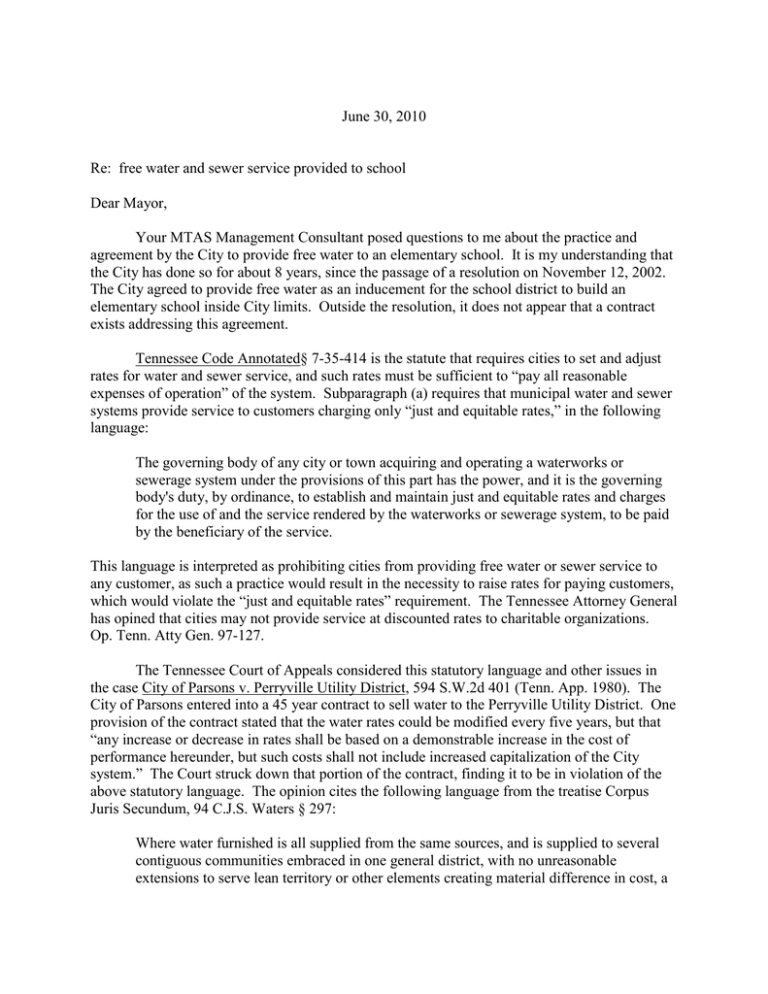June 30, 2010 Dear Mayor,
advertisement

June 30, 2010 Re: free water and sewer service provided to school Dear Mayor, Your MTAS Management Consultant posed questions to me about the practice and agreement by the City to provide free water to an elementary school. It is my understanding that the City has done so for about 8 years, since the passage of a resolution on November 12, 2002. The City agreed to provide free water as an inducement for the school district to build an elementary school inside City limits. Outside the resolution, it does not appear that a contract exists addressing this agreement. Tennessee Code Annotated§ 7-35-414 is the statute that requires cities to set and adjust rates for water and sewer service, and such rates must be sufficient to “pay all reasonable expenses of operation” of the system. Subparagraph (a) requires that municipal water and sewer systems provide service to customers charging only “just and equitable rates,” in the following language: The governing body of any city or town acquiring and operating a waterworks or sewerage system under the provisions of this part has the power, and it is the governing body's duty, by ordinance, to establish and maintain just and equitable rates and charges for the use of and the service rendered by the waterworks or sewerage system, to be paid by the beneficiary of the service. This language is interpreted as prohibiting cities from providing free water or sewer service to any customer, as such a practice would result in the necessity to raise rates for paying customers, which would violate the “just and equitable rates” requirement. The Tennessee Attorney General has opined that cities may not provide service at discounted rates to charitable organizations. Op. Tenn. Atty Gen. 97-127. The Tennessee Court of Appeals considered this statutory language and other issues in the case City of Parsons v. Perryville Utility District, 594 S.W.2d 401 (Tenn. App. 1980). The City of Parsons entered into a 45 year contract to sell water to the Perryville Utility District. One provision of the contract stated that the water rates could be modified every five years, but that “any increase or decrease in rates shall be based on a demonstrable increase in the cost of performance hereunder, but such costs shall not include increased capitalization of the City system.” The Court struck down that portion of the contract, finding it to be in violation of the above statutory language. The opinion cites the following language from the treatise Corpus Juris Secundum, 94 C.J.S. Waters § 297: Where water furnished is all supplied from the same sources, and is supplied to several contiguous communities embraced in one general district, with no unreasonable extensions to serve lean territory or other elements creating material difference in cost, a uniform rate for the entire territory is indicated and ordinarily justified…A classification must, however, in order to be valid, comport with the rule or principle of sound legislative classification, in that there must be some actual difference of situation and condition, bearing a reasonable and just relation to the matter of rates; and an arbitrary or unreasonable classification amounts to unjust discrimination. Likewise, it is unjust discrimination to differentiate between different services by charging rates for one which are out of all proportion as compared with the rates charged for another, or to impose on one consumer, or class of consumers, losses caused by charging inadequate rates to another consumer or class. City of Parsons, at p. 406. Finding that our state law imposes the obligation on cities to set just and equitable rates, and to revise those rates so as to provide revenues to support the system, the Court determined that the City had no power by contract to hamper or impair this statutory duty. The Court states “the city had no power to bind itself to a rate for forty-five years which was not subject to increase to reflect the costs of increased capitalization of the system.” Id. at 407. Based on the City of Parsons case and other research, it is my conclusion that your City does not have the legal authority to provide free or sewer service water to a school, or to any other entity. Such actions violate our statutes requiring that rates be equitable and that rates charged be sufficient to fund the operations of the water system. Your MTAS management consultant posed the following questions: Does the legal staff feel…that Tennessee cities may not enter into contracts to provide free water to any particular party? Yes. I have consulted with MTAS Senior Legal Consultant Sid Hemsley, and he agrees that such contracts or agreements are prohibited by law and are unenforceable. If the City lacks authority to enter into such agreements, what is the enforceability of the City’s 2002 resolution? Can it be enforced by either party? No. The resolution is not an actual contract, although the school district is the beneficiary. In any event, it is not enforceable, and the City may simply repeal the resolution. In the event of a lawsuit, the school district will likely claim (1) that both parties entered into this arrangement in good faith; and (2) that the school district’s site selection decision was predicated in large part on the inducement of free water. In your opinion, would such an argument be successful? How might the City respond to this position? No, such an argument at trial would not be successful. The City may rely on the case City of Parsons v. Perryville Utility District, 594 S.W.2d 401 (Tenn. App. 1980) for the principal that such agreements, contracts or arrangements are illegal and unenforceable, despite the intent of the parties or good faith dealings. A motion for summary judgment containing this legal argument should be sufficient to defeat a lawsuit, without the expense of a trial. It is interesting that no actual written contract exists between the City and the school district. A resolution is not a contract, and may be repealed on one vote of the governing body. If the City lacks the authority to give the school district free water, what are the implications of continuing to do so at this point? Other customers and ratepayers of the City water and sewer system can sue the City for refund of rates paid, if it is shown that rates have been adjusted since 2002 to compensate for the cost of free service being provided to the school. If rates have not been adjusted since free water and sewer service for the school was instituted, then how has the City funded the utility operations? The underlying question is “how much has it cost the paying customers of the water system to fund this free water and sewer service given to the school?” I do not know the specific operations of the municipal auditing system enforced through the Comptroller’s office and through the TDEC division that oversees rate setting and water loss accounting. It appears that steep increases in rates will be required to remedy this situation, whether the City voluntarily imposes such rates or is forced to do so under court or agency order. I hope this information is helpful. Please let me know if you need further assistance. Sincerely, Melissa A. Ashburn Municipal Legal Consultant

